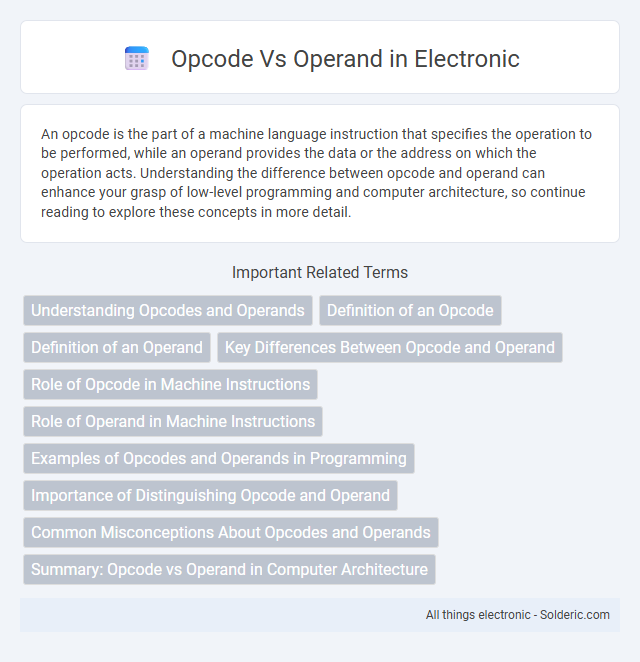An opcode is the part of a machine language instruction that specifies the operation to be performed, while an operand provides the data or the address on which the operation acts. Understanding the difference between opcode and operand can enhance your grasp of low-level programming and computer architecture, so continue reading to explore these concepts in more detail.
Comparison Table
| Aspect | Opcode | Operand |
|---|---|---|
| Definition | Instruction code specifying the operation to perform | Data or address on which the operation acts |
| Function | Defines the operation (e.g., ADD, SUB) | Provides input values or memory locations |
| Type | Operation code part of an instruction | Argument or parameter of the instruction |
| Example | LOAD, STORE, JMP | Register number, memory address, immediate value |
| Location in Instruction | Typically first field | Follows the opcode in instruction format |
| Role in Execution | Determines the operation performed by CPU | Specifies the data involved in the operation |
Understanding Opcodes and Operands
Opcodes and operands form the fundamental components of machine instructions in computer architecture, where the opcode specifies the operation to be performed and the operand provides the data or the address of the data needed for that operation. Understanding opcodes involves recognizing their role in directing the processor to execute specific commands such as arithmetic, logic, control, or data transfer operations. Mastery of operands includes knowing how immediate values, registers, or memory addresses are used to modify or retrieve data during instruction execution.
Definition of an Opcode
An opcode, short for operation code, is a portion of a machine language instruction that specifies the operation to be performed by the processor. It directs the central processing unit (CPU) to execute a specific command such as addition, subtraction, or data transfer. Opcodes are fundamental components in assembly language and machine code, enabling precise control over hardware execution.
Definition of an Operand
An operand is a data value or a memory address on which an instruction operates within a computer's central processing unit (CPU). It can represent constants, registers, variables, or memory locations that provide the actual input for the operation specified by the opcode. Understanding operands is crucial for interpreting machine-level instructions and executing precise computational tasks.
Key Differences Between Opcode and Operand
Opcode specifies the instruction that the CPU must execute, defining the operation type such as addition or data transfer. Operand represents the data or the address of the data on which the instruction operates, providing the necessary inputs for the command. While opcode determines the action, the operand supplies the values or locations required to perform that action, making their roles fundamentally distinct in instruction execution.
Role of Opcode in Machine Instructions
The opcode in machine instructions defines the specific operation the processor must perform, acting as a command code that directs the CPU's control unit. It is essential for interpreting the instruction set architecture, enabling tasks like arithmetic operations, data transfer, and control flow changes. By specifying the operation type, the opcode distinguishes each instruction from others, ensuring precise execution within the processor.
Role of Operand in Machine Instructions
The operand in machine instructions specifies the data or the memory address involved in the operation defined by the opcode, enabling precise execution of commands. Your processor uses operands to fetch values, perform calculations, or determine the location of data, making them essential for accurate instruction execution. Without operands, the opcode alone cannot manipulate or process the required data effectively.
Examples of Opcodes and Operands in Programming
Opcodes represent the specific machine instructions such as ADD, MOV, or SUB that tell the processor what operation to perform. Operands are the data or memory addresses on which these operations act, like registers (AX, BX), constants (5, 0xFF), or memory locations. Understanding how opcodes and operands work helps you write efficient assembly and low-level code by clearly defining what action to execute and on which data.
Importance of Distinguishing Opcode and Operand
Distinguishing opcode and operand is crucial for accurate instruction execution in computer architecture. The opcode specifies the operation to perform, while the operand provides the data or the address to act upon. Clear separation ensures efficient decoding, reduces processing errors, and optimizes CPU performance during program execution.
Common Misconceptions About Opcodes and Operands
Common misconceptions about opcodes and operands often confuse the two terms, assuming they both represent operations when opcodes specifically designate the operation to be performed, and operands are the data or addresses involved in that operation. Many believe operands are optional or interchangeable, but they are essential for providing the necessary context or values the opcode requires to execute correctly. Understanding the clear distinction between opcode as the instruction identifier and operand as the instruction's data enhances your ability to decode machine language programs accurately.
Summary: Opcode vs Operand in Computer Architecture
Opcode represents the part of a machine language instruction that specifies the operation to be performed, such as ADD or SUBTRACT. Operand refers to the data or memory locations on which the operation acts, including registers, immediate values, or addresses. Understanding the distinction between opcode and operand is essential for decoding instructions and executing programs efficiently in computer architecture.
opcode vs operand Infographic

 solderic.com
solderic.com